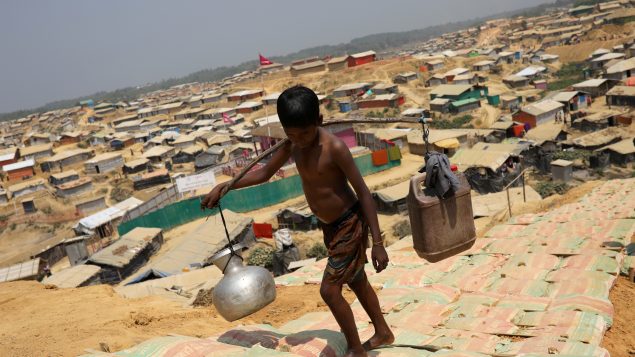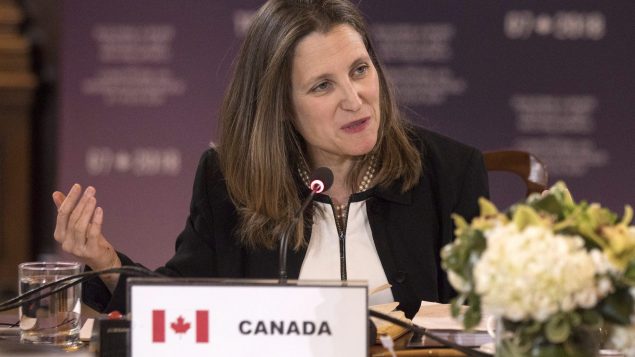Foreign Affairs Minister Chrystia Freeland will travel to Bangladesh next week to address the 45th Session of the Organisation of Islamic Cooperation (OIC) Council of Foreign Ministers on the unfolding Rohingya crisis in Myanmar and Bangladesh, Global Affairs Canada officials announced Thursday.
Freeland’s address to the 57-member body that is seen as the collective voice of the Muslim world will mark the first time a minister from a non-member country addresses the Session of the OIC’s Council of Foreign Ministers, officials said.
The session will also include discussion on issues such as economic collaboration, Islamophobia, and humanitarian crises and conflicts, including the Rohingya crisis in the Rakhine state of Myanmar, also known as Burma, and the neighbouring Cox’s Bazar area of southern Bangladesh.
“Canada deeply values its relationships with the diversity of countries and people represented in the Organisation of Islamic Cooperation,” Freeland said in a statement.
“We are eager to discuss how we can take action with OIC partners to support the Rohingya, who faced unspeakable persecution and who have been the victims of crimes against humanity.”
Along with international partners, Canada will work to establish a clear pathway towards accountability for the atrocities and human rights violations committed in Rakhine State and coordinate efforts to build lasting peace in Myanmar, Freeland added.
Visit to Rohingya refugee camps

A Rohingya refugee boy carries water in the Kutupalong refugee camp, in Cox’s Bazar, Bangladesh March 22, 2018. (Mohammad Ponir Hossain/REUTERS)
During her visit, Freeland will be accompanied by Bob Rae, Prime Minister Justin Trudeau’s Special Envoy to Myanmar, and Ambassador Masud Husain, Canada’s Special Envoy to the OIC.
They will visit the Cox’s Bazar area, which hosts several refugee camps, including the Kutupalong camp, home to over 680,000 Rohingya refugees that has become the fourth largest city in Bangladesh.
Earlier this month, Rae unveiled his final report into the crisis, calling on Canada to take a leadership role in responding to the needs of the Rohingya Muslim minority fleeing a brutal campaign of ethnic cleansing led by Burmese security forces in the predominantly Buddhist Myanmar.
“Canada’s response should focus on providing humanitarian assistance, education, supporting infrastructure, and mitigating the impact of the violent deportation on Rohingya women and girls by providing strong support to UN and other international organizations working in camps and elsewhere,” Rae said in his report unveiled on April 3.
“Education in particular should become a priority for our longer-term approach.”
The report, entitled Tell them we’re human, also calls on Canada to develop a multi-year funding plan estimated by Rae to cost about $150 million for the next four years.
Monsoon rains coming

Rohingya refugees try to take shelter from torrential rain as they are held by the Border Guard Bangladesh (BGB) after illegally crossing the border, in Teknaf, Bangladesh, August 31, 2017. (Mohammad Ponir Hossain/REUTERS)
Freeland’s visit also comes as the United Nations and humanitarian NGOs are scrambling to prepare for the beginning of the monsoon season that is expected to wreak havoc in the camps built on hilly terrain vulnerable to landslides and flash floods.
The United Nation’s International Organization for Migration estimates that at least 150,000 Rohingya in the Cox’s Bazar face life-threatening risks from landslides and floods, and thousands more are at risk of disease and being cut off from assistance.
The UN’s joint response plan launched last month calls for $951 million US to assist 1.3 million people, including 884,000 Rohingya refugees and 336,000 host community members.
Freeland has meetings with various Bangladeshi government officials to discuss further steps to address this dire situation, Global Affairs said in a press-release.
Since the beginning of 2017, Ottawa has provided more than $45.9 million to deliver the desperately needed humanitarian assistance to thousands of people in Bangladesh and Myanmar.
In addition, individual Canadians have raised $12.5 million for the Myanmar Crisis Relief Fund, set up to respond to the Rohingya crisis.







For reasons beyond our control, and for an undetermined period of time, our comment section is now closed. However, our social networks remain open to your contributions.